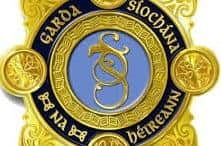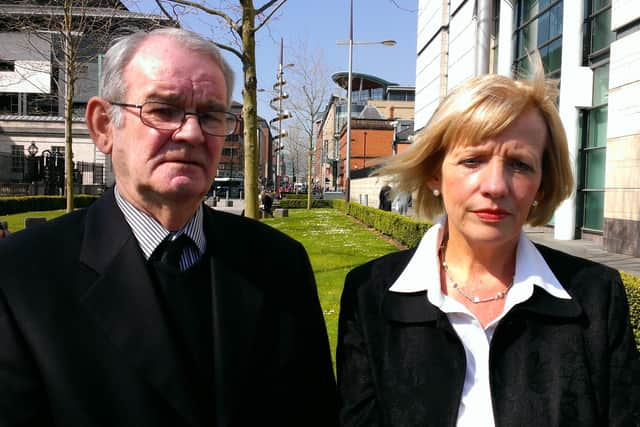Garda behind closed doors: Woman whose brother murdered by IRA slams Republic of Ireland after being barred from private Garda evidence in Dublin
and live on Freeview channel 276
In a first for legacy Troubles investigations, a senior Garda officer has answered questions in an Irish court sitting in private about an atrocity in NI - the Kingsmills Massacre.
It is understood that this hearing took place in Dublin High Court in March - with no relatives, their lawyers or media allowed to be present. The transcript is unlikely to be made public.
Advertisement
Hide AdAdvertisement
Hide AdTen Protestant civilians were shot by the IRA in south Armagh in 1976. The Historical Enquiries Team said attack was from planned from the south, the killers fled there afterwards; some of the weapons and vehicles were recovered there and the top three suspects served time there for terror offences.


In 2015 Taoiseach Enda Kenny promised the families full disclosure of all related Irish security files, however none were ever handed over. Accoding to the families, any files handed over consist almost entirely of newspaper clippings.
Since early 2014 Coroner Judge Brian Sherrard repeatedly appealed to the Garda to voluntarily appear at the legacy inquest, however they declined. Instead, Dublin passed a law in 2019 to allow a senior Gardai to answer questions from the families - but in an Irish court - and without cross examination by the families’ lawyers.
Karen Armstrong, whose brother John McConville was murdered, said they wanted to attend the Dublin hearing but were not allowed to.
Advertisement
Hide AdAdvertisement
Hide Ad“Nor was the witness cross examined. As far as we are concerned it was a closed hearing. We will get a transcript of the evidence but that’s all.


“With so many suspects involved in the murder of John and his colleagues and in the attempted murder of Alan Black [the sole survivor], living openly in the Republic of Ireland after the attack, we would have no faith in Irish Justice. We were promised an openness from the Republic of Ireland in promises to our family and the other families.
“But all we have had is token disclosure and a procedure which was held in private with no family participation.
“If you walked in our shoes you would conclude that the Republic of Ireland is not interested in open justice, are quick off the mark to criticise other countries but they really need to take a hard look at their own practices.”
Advertisement
Hide AdAdvertisement
Hide AdAlan Black, who was shot 16 times in the attack but survived, said the pathologist who gave evidence at the Kingsmill Inquest compared the murders to “something which would have taken place at the height of the Bosnian war”.He added: “There are terrorists who done this who are still hiding in the South and I often wonder are they also being protected by the authorities in the South? A Public Inquiry may be the way forward to include both jurisdictions-it can’t be right, mass murder and no proper meaningful co-operation between the two countries-why not?”.
Solicitor Barry O’Donnell, who acts for Ms Armstrong and Mr Black, said: “The families we represent would have preferred a Garda witness appearing before the Coroner in Belfast and being seen in Court and cross examined by their legal team. It happened in the Smithwick Tribunal-why not in the Kingsmill Inquest? Considering we are looking into the murder of 10 people and the attempted murder of 1 person, this is not acceptable.” He added that it was “a dangerous precedent to set”.
The coroner told the News Letter he has received evidence from An Garda Siochana and that the transcript and documents provided are undergoing a final check for provision to the Next-of-Kin.
He said that, following a legal challenge on the matter by Alan Black, he would make a decision on naming the chief suspect responsible for the massacre when all submissions are final. Relatives of the deceased have provided the inquest with a long list of other legacy inquests where suspects were named but the Coroner has expressed concern that even though the chief suspect is deceased, naming him could put others close to him in danger. However the families counter that BBC Spotlight has already named him.
Advertisement
Hide AdAdvertisement
Hide AdA significant proportion of the Kingsmills families previously formally cut ties with the inquest in protest at what they saw as its failure to serve their needs.
Kenny Donaldson, spokesman for Innocent Victims United, said: “These revelations very much feed the narrative that the Irish State is driven by a culture of silence, of suppression of the truth”.
However the Irish Department of Justice insisted that there had been continued cooperation with the inquest - something persistently rejected by all the families and their legal teams in open court throughout the life of the inquest.
In a statement The Irish Department of Justice said: “The Irish Government is committed to providing as much information as possible, in accordance with the law, to the Coroner’s Inquest in Northern Ireland regarding this tragic event. There has been continuous cooperation with the Coroner and his legal team as part of an ongoing legal process. Every effort has been made to facilitate cooperation with the Coroner, including the enactment of primary legislation - the Criminal Justice (International Co-operation) Act 2019.
Advertisement
Hide AdAdvertisement
Hide Ad“An Garda Síochána has already made transfers of relevant material to the Coroner, and provided testimony in accordance with the 2019 legislation. They remain ready to engage on any further queries which the Coroner may have.”
A Garda spokesman said it cannot comment on matters that took place ‘in camera’ [meaning in private] before the High Court. “An Garda Síochána is committed to and continues to assist the Northern Ireland Authorities into historical investigations,” he added.
READ MORE: